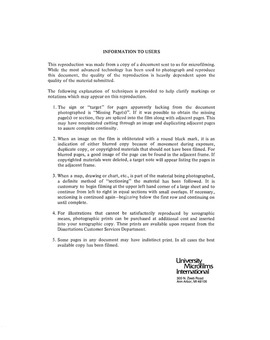| dc.contributor.author | Recor, Richard, | en_US |
| dc.date.accessioned | 2013-08-16T12:29:17Z | |
| dc.date.available | 2013-08-16T12:29:17Z | |
| dc.date.issued | 1984 | en_US |
| dc.identifier.uri | https://hdl.handle.net/11244/5292 | |
| dc.description.abstract | Each subject listened to a 10-minute audiotape of a male counselor describing the Systematic Training for Effective Parenting (STEP) Program, and inviting the subject to participate in the program. The counselor's description was changed in each condition even though the audiotape remained constant. The subjects rated the counselor on the Counselor Rating Form-Short Version (CRF-S) on the dimensions of expertness, trustworthiness, and attractiveness. Next the subjects rated their child's behavior on the 32-item Adlerian Parental Assessment of Child Behavior Scale (APACBS), as they expected it to be like after the 9-week STEP group. Finally, the subjects rated their willingness to participate (WIP), as well as provided additional administrative data. | en_US |
| dc.description.abstract | The CRF-S dimensions of expertness, trustworthiness, and attractiveness were significantly correlated (p < .01), as were the APACBS and WTP measures (p < .05). The MANOVA resulted in a significant Professional Status x Child Status interaction (p < .05). A significant 3-way ANOVA on the APACBS (p < .01), and a significant 1-way ANOVA on the Professional Status x Child Status interaction (p < .001) revealed higher expectations for the Paraprofessional with Children than the Paraprofessional without Children (p < .002) and the Professional with Children (p < .01). The Professional without Children was rated significantly higher than the Paraprofessional without Children on the expectancy measure (p < .02). The results suggest the need for trained paraprofessionals with children for increasing expectations and for administrative reasons in parent training. Counselor professional status, marital status, and child status did not impact parents' perceptions of counselor expertness, attractiveness, and trustworthiness. There was a trend for parents who rated their child's behavior highly, to be less willing to attend. | en_US |
| dc.description.abstract | The impact of counselor professional status, marital status, and child status on parent perceptions of the counselor, expected child behavior, and willingness to participate in parent training is examined using analogue methods in a field setting. Forty-eight white females, who had children between the ages of 5-12 in treatment at one of two Child Guidance Clinics, were randomly assigned to one of eight experimental conditions. A 2 (Professional vs. Paraprofessional) x 2 (Married vs. Not Married) x 2 (Children vs. No Children) completely randomized Factorial Design was used with six subjects per condition. | en_US |
| dc.format.extent | vi, 183 leaves ; | en_US |
| dc.subject | Education, Guidance and Counseling. | en_US |
| dc.title | Initial influence of counselor characteristics in parent training / | en_US |
| dc.type | Thesis | en_US |
| dc.thesis.degree | Ph.D. | en_US |
| dc.thesis.degreeDiscipline | Department of Psychology | en_US |
| dc.note | Source: Dissertation Abstracts International, Volume: 45-08, Section: A, page: 2401. | en_US |
| ou.identifier | (UMI)AAI8425545 | en_US |
| ou.group | College of Arts and Sciences::Department of Psychology | |
